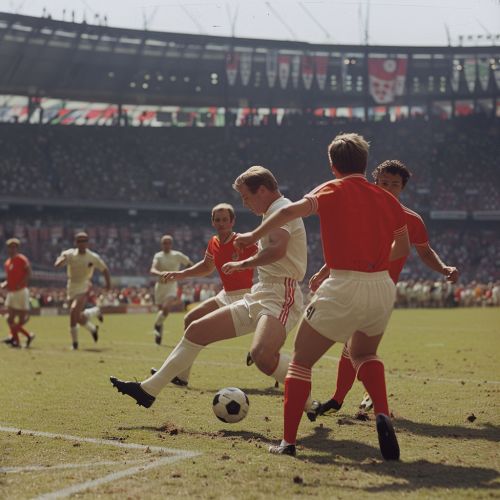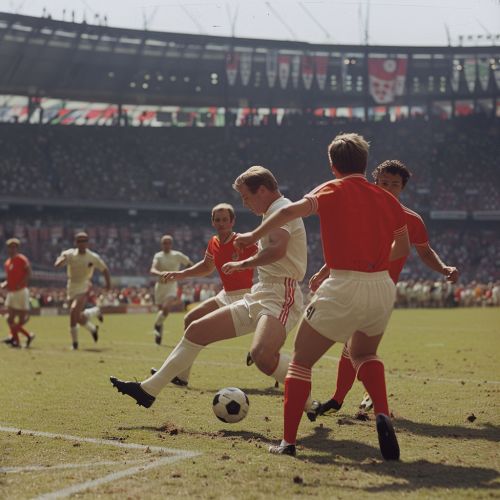List of Olympic medalists in football: Difference between revisions
(Created page with "== Introduction == The Olympic Games, a premier international sporting event, have featured football (soccer) since the early 20th century. This article provides a comprehensive list of Olympic medalists in football, detailing the history, notable achievements, and key figures in the sport. The focus is on both men's and women's tournaments, highlighting the evolution and significance of football in the Olympics. == Historical Overview == Football was first included...") |
No edit summary |
||
| Line 97: | Line 97: | ||
* [[Football at the Summer Olympics]] | * [[Football at the Summer Olympics]] | ||
[[Image:Detail-97165.jpg|thumb|center|Action shot of a football match during the Olympics.|class=only_on_mobile]] | |||
[[Image:Detail-97166.jpg|thumb|center|Action shot of a football match during the Olympics.|class=only_on_desktop]] | |||
[[Category:Olympic medalists in football]] | [[Category:Olympic medalists in football]] | ||
[[Category:Football at the Summer Olympics]] | [[Category:Football at the Summer Olympics]] | ||
[[Category:Lists of Olympic medalists]] | [[Category:Lists of Olympic medalists]] | ||
Latest revision as of 06:26, 24 July 2024
Introduction
The Olympic Games, a premier international sporting event, have featured football (soccer) since the early 20th century. This article provides a comprehensive list of Olympic medalists in football, detailing the history, notable achievements, and key figures in the sport. The focus is on both men's and women's tournaments, highlighting the evolution and significance of football in the Olympics.
Historical Overview
Football was first included in the Olympic Games in 1900 for men and in 1996 for women. The men's tournament has undergone various changes in format, eligibility, and rules, reflecting the sport's growth and professionalization. The women's tournament, although younger, has rapidly gained prominence and prestige.
Early Years (1900-1932)
The early Olympic football tournaments were dominated by European teams, with Great Britain, Belgium, and Uruguay emerging as early powerhouses. The 1924 and 1928 tournaments saw Uruguay's dominance, which laid the foundation for their future success in the FIFA World Cup.
Post-War Era (1948-1980)
The post-war era saw the rise of Eastern European teams, with Hungary, the Soviet Union, and Yugoslavia achieving significant success. The 1952 Helsinki Olympics marked the beginning of Hungary's golden era, led by legendary players such as Ferenc Puskás.
Modern Era (1984-Present)
The modern era of Olympic football has seen increased participation from non-European teams, with countries like Nigeria, Argentina, and Brazil making their mark. The introduction of the women's tournament in 1996 added a new dimension, with the United States and Germany emerging as dominant forces.
Men's Tournament
The men's Olympic football tournament has a rich history, with numerous memorable matches and legendary players. Below is a detailed list of medalists by year.
1900-1936
- **1900 Paris**: Gold - Great Britain, Silver - France, Bronze - Belgium
- **1904 St. Louis**: Gold - Canada, Silver - United States, Bronze - United States
- **1908 London**: Gold - Great Britain, Silver - Denmark, Bronze - Netherlands
- **1912 Stockholm**: Gold - Great Britain, Silver - Denmark, Bronze - Netherlands
- **1920 Antwerp**: Gold - Belgium, Silver - Spain, Bronze - Netherlands
- **1924 Paris**: Gold - Uruguay, Silver - Switzerland, Bronze - Sweden
- **1928 Amsterdam**: Gold - Uruguay, Silver - Argentina, Bronze - Italy
- **1932 Los Angeles**: No football tournament held
- **1936 Berlin**: Gold - Italy, Silver - Austria, Bronze - Norway
1948-1980
- **1948 London**: Gold - Sweden, Silver - Yugoslavia, Bronze - Denmark
- **1952 Helsinki**: Gold - Hungary, Silver - Yugoslavia, Bronze - Sweden
- **1956 Melbourne**: Gold - Soviet Union, Silver - Yugoslavia, Bronze - Bulgaria
- **1960 Rome**: Gold - Yugoslavia, Silver - Denmark, Bronze - Hungary
- **1964 Tokyo**: Gold - Hungary, Silver - Czechoslovakia, Bronze - East Germany
- **1968 Mexico City**: Gold - Hungary, Silver - Bulgaria, Bronze - Japan
- **1972 Munich**: Gold - Poland, Silver - Hungary, Bronze - East Germany
- **1976 Montreal**: Gold - East Germany, Silver - Poland, Bronze - Soviet Union
- **1980 Moscow**: Gold - Czechoslovakia, Silver - East Germany, Bronze - Soviet Union
1984-Present
- **1984 Los Angeles**: Gold - France, Silver - Brazil, Bronze - Yugoslavia
- **1988 Seoul**: Gold - Soviet Union, Silver - Brazil, Bronze - West Germany
- **1992 Barcelona**: Gold - Spain, Silver - Poland, Bronze - Ghana
- **1996 Atlanta**: Gold - Nigeria, Silver - Argentina, Bronze - Brazil
- **2000 Sydney**: Gold - Cameroon, Silver - Spain, Bronze - Chile
- **2004 Athens**: Gold - Argentina, Silver - Paraguay, Bronze - Italy
- **2008 Beijing**: Gold - Argentina, Silver - Nigeria, Bronze - Brazil
- **2012 London**: Gold - Mexico, Silver - Brazil, Bronze - South Korea
- **2016 Rio de Janeiro**: Gold - Brazil, Silver - Germany, Bronze - Nigeria
- **2020 Tokyo**: Gold - Brazil, Silver - Spain, Bronze - Mexico
Women's Tournament
The women's Olympic football tournament has grown in stature since its inception in 1996. Below is a detailed list of medalists by year.
1996-2008
- **1996 Atlanta**: Gold - United States, Silver - China, Bronze - Norway
- **2000 Sydney**: Gold - Norway, Silver - United States, Bronze - Germany
- **2004 Athens**: Gold - United States, Silver - Brazil, Bronze - Germany
- **2008 Beijing**: Gold - United States, Silver - Brazil, Bronze - Germany
2012-Present
- **2012 London**: Gold - United States, Silver - Japan, Bronze - Canada
- **2016 Rio de Janeiro**: Gold - Germany, Silver - Sweden, Bronze - Canada
- **2020 Tokyo**: Gold - Canada, Silver - Sweden, Bronze - United States
Notable Players and Teams
The Olympic football tournaments have seen numerous legendary players and teams. Some of the most notable include:
Men's Tournament
- **Ferenc Puskás**: Hungarian forward who led Hungary to gold in 1952.
- **Romário**: Brazilian forward who played a crucial role in Brazil's silver medal in 1988.
- **Lionel Messi**: Argentine forward who led Argentina to gold in 2008.
Women's Tournament
- **Mia Hamm**: American forward who led the United States to gold in 1996 and 2004.
- **Birgit Prinz**: German forward who played a key role in Germany's bronze medals in 2000 and 2004.
- **Christine Sinclair**: Canadian forward who led Canada to gold in 2020.
Evolution of the Tournament
The Olympic football tournament has evolved significantly over the years, with changes in format, eligibility, and rules.
Men's Tournament
Initially, the men's tournament was open to all players, but in 1984, FIFA introduced age restrictions, limiting teams to under-23 players with a few over-age exceptions. This change aimed to differentiate the Olympics from the World Cup and promote youth development.
Women's Tournament
The women's tournament has always been open to all players, reflecting the sport's growth and the increasing opportunities for women in football.
Impact and Legacy
The Olympic football tournament has had a significant impact on the sport, providing a platform for young players to showcase their talent and for countries to achieve international success. The tournament has also contributed to the global growth of football, particularly in regions where the sport was less popular.
See Also
- FIFA World Cup
- UEFA European Championship
- Copa América
- Women's World Cup
- Football at the Summer Olympics


